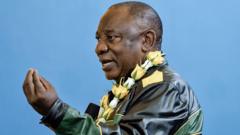Nike's price adjustments reflect the broader economic climate as companies grapple with tariffs, with Adidas also warning of similar moves.
Nike to Increase Prices Amid Tariff Uncertainty

Nike to Increase Prices Amid Tariff Uncertainty
Nike plans to raise prices on select products in the U.S. starting June 1, influenced by ongoing tariffs impacting imports.
Nike is set to implement price hikes on various trainers and clothing items in the U.S. starting June 1, as the uncertainty surrounding import tariffs continues to affect the market. Although Nike did not specifically cite U.S. tariffs as the reason behind the increase, they acknowledged the ongoing need to make "price adjustments" as part of their regular business evaluation. The sportswear leader follows rival Adidas, which recently indicated it would also need to raise prices due to tariff-related costs.
The majority of Nike's products are manufactured in Asia, particularly in countries that face high tariffs from the U.S., with President Donald Trump’s administration having imposed a base 10% import tax on numerous items. Trump had previously disputed claims that tariffs would lead to price increases, notably criticizing major retailers such as Walmart for linking their hikes to the tariffs.
Nike's finance chief, Matt Friend, highlighted the various external factors creating uncertainty in the operating environment, including tariffs. Starting Sunday, June 1, shoes priced above $100 will see price increases of up to $10, while clothing and equipment will rise between $2 and $10. However, popular models like the Air Force 1 trainers, shoes costing less than $100, and certain children's products will not be affected.
Adidas had expressed that U.S. tariffs would impact costs for popular items, and recently, UK retailer JD Sports echoed the sentiment, noting that price rises due to tariffs could influence customer demand. Companies like Nike are navigating the unstable terrain established by the U.S. trade policies, especially since a current pause on higher tariffs is due to expire in July.
Vietnam emerges as a crucial manufacturing hub for Nike, producing more than half of its footwear and a significant portion of clothing. The country could face some of the steepest tariffs under Trump’s policies, significantly impacting production costs. The current trade negotiations bring a sense of urgency as brand leaders reconsider their pricing strategies.
Additionally, Nike plans to restart direct sales on Amazon in the U.S. after halting them in 2019, owing to a strategy shift towards prioritizing its own website and retail stores. However, the brand has experienced a downturn in online sales across various regions, triggering a leadership change to focus on a turnaround strategy targeting key markets including the U.S., UK, and China.





















